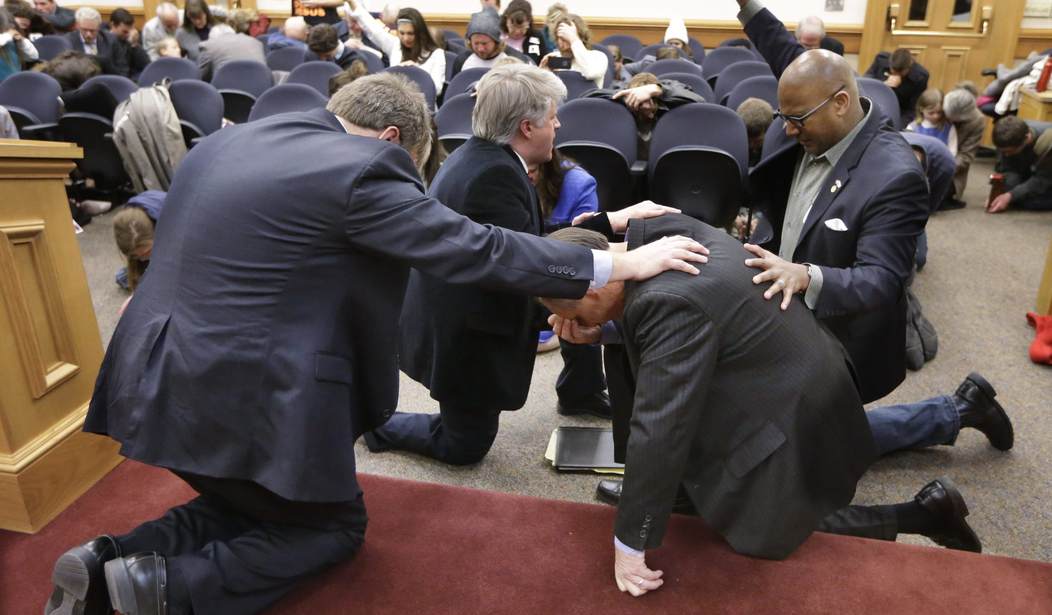Family Action Council of Tennessee president David Fowler blamed the March 22 rejection of Senate Bill 771, the so-called “Bathroom Bill,” on North Carolina.
Just like North Carolina’s HB 2 legislation, the Tennessee version would have required people to use restrooms and locker rooms in public schools and buildings that fit their biological gender.
The ACLU and the Tennessee Equality Project called the legislation discriminatory and warned they would brand Tennessee as the “state of hate,” and cost the Tennessee economy hundreds of millions of dollars.
Fowler said SB 771 was only intended to make sure “no biological male could use the junior high girl’s bathroom or locker room.”
He and other supporters of the bill complained that the Senate Education Committee gaveled it to death too quickly instead of allowing a healthy debate.
“Schools were allowed to make accommodations for students who do not ‘identify’ with their biological sex. It was a common-sense bill,” Fowler added.
Opponents of the legislation, like Henry Seaton, the LGBT organizer for the ACLU of Tennessee, celebrated the defeat of SB 771.
“It seems like we are making progress on teaching these legislators on what being transgender in Tennessee is like,” Seaton told the Tennessean.
Republican Rep. Mark Pody, who sponsored the House version of the Bathroom Bill, said he was disappointed, but would try again to win approval for the legislation.
“I want to move forward with whatever we can to protect our children,” Pody said.
However, the Bathroom Bill was only one of a half-dozen pieces of proposed Tennessee legislation that the TEP warns could brand Tennessee as the “state of hate.”
Tennessee Equality Project executive director Chris Sanders wrote in the Tennessean that “subtle is the new hatred” in the state’s legislature.
Sanders said another bill on the TEP’s “Slate of Hate,” the Tennessee Marriage Defense Act, which states it would be the policy of Tennessee to define marriage as being between one man and one woman, would expose same-sex marriage couples to discrimination “with dire consequences and prevent other same-sex couples from getting married while it is challenged in the courts.”
Rep. Pody sponsored the Marriage Defense Act in the House.
Pody’s rationale is that since he believes most people in Tennessee see marriage as being between a man and a woman, and traditional marriage is the “law of the land” in Tennessee, the Supreme Court’s Obergefell decision “is unauthoritative, void, and of no effect.”
Also on the TEP’s hit list, and another example of the culture war being waged in Tennessee’s legislature, is House Bill 1111.
The Tennessee Equality Project sees HB 1111 as nothing but a “sneaky LGBT erasure,” while the Family Action Council of Tennessee views it as a logical preservation of the real meanings of words like father, mother, wife and husband.
HB 1111, which “requires words be given their natural and ordinary meaning, without forced or subtle construction that would limit or extend the meaning of the language except when a country intention is clearly manifest,” goes back to the Senate for a third and final consideration after being approved by the Senate on March 16.
Other legislation, like House Bill 54, would block any state or local government from punishing any business for exercising what the TEP considers discrimination against the LGBTQ community and the Family Action Council would describe as religious liberty.
Rep. Jason Zachary told WBIR his proposal would also cover health insurance, family leave, and minimum wage policies.
“This is an equal protection bill that protects everybody on the state and local level from discriminatory actions of government getting into business,” said Zachary, a Knoxville Republican.
“We’re simply saying that government is not going to step into business and enforce or make you do something that’s outside of state law,” Zachary added.
The TEP has also criticized SB 127/HB 54, another piece of legislation that would protect the traditional meaning of words like “mother” and “father,” and SB 1153/HB 1406, which would repeal a statute that said a child born to a married woman as a result of artificial insemination, with consent of the married woman’s husband, is to be considered the legitimate child of the husband and wife.
But as far as Fowler is concerned, this is about more than a couple — or even six —pieces of legislation.
Fowler said the TEP and ACLU have been able to use the backlash against North Carolina’s Bathroom Bill legislation as an effective scare tactic regarding all of the legislation the LGBT community opposes.
“But the boycott’s effect was negligible. It cost North Carolina less than one-tenth of one percent of its gross domestic product,” Fowler said. “To put that in perspective, North Carolina thought the privacy and safety of their people was worth losing $1 out of $1,000.”
As far as he is concerned, the real reason these bills are having trouble in the Tennessee Legislature is that lawmakers of both parties are worried about “looking good.”
“In that regard, and taking a long-term view of things, Scripture tells us that God looks down from Heaven and observes all the ways of mankind,” Fowler wrote on his blog.
“God’s judgment in regard to our sexuality is clear – we were made male and female, and we were designated by Him as such based on how we were made, not how we felt,” Fowler concluded. “I wonder how we look in His eyes.”









Join the conversation as a VIP Member